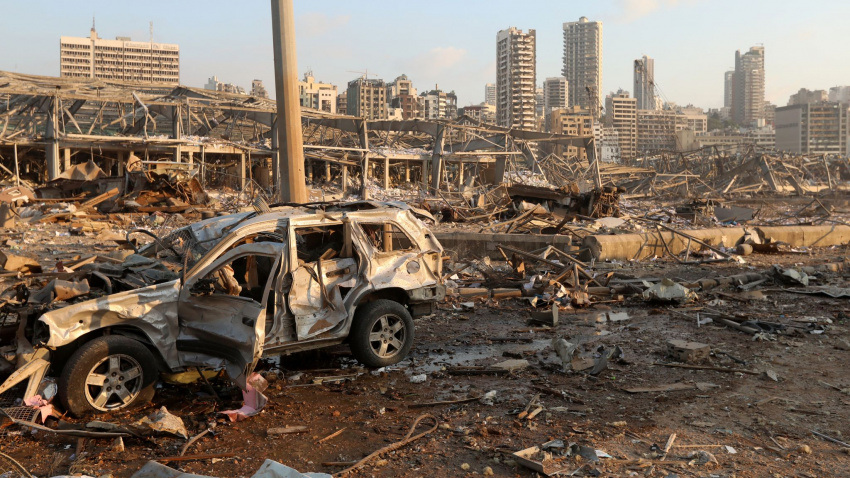The Beirut Explosion and the Changing Balance of Power

As the dust of the massive explosion that decimated Lebanon's capital city begins to settle, the inevitable political and geostrategic ramifications impacting the country and the broader region have surfaced, requiring close scrutiny. For the fragile, economically-battered and pandemic-hit Lebanon, this tragedy could not have come at a worse time and is bound to set back the cause of Lebanon's political unity and internal peace, in light of the angry post-blast demonstrations seeking to topple the government, some of whose ministers have already resigned.
Given the utter negligence behind the unsafe storage of nearly 3000 tons of ammonium nitrite since 2013, past Lebanese governments, including that of Said Hariri, whose March 19 forces were in charge of the Beirut port area where the blast occurred, it is a safe bet that the blame game and the related rise of a new politics of discord and disunity will plague Lebanon for the foreseeable future. On the other hand, various Western governments offering aid to Lebanon, such as France and England, have attached conditions, such as "political reform," working in tandem with other regional governments to bring about an anti-Hezbollah government in power, to replace the present government that has cordial, working relationship with the Iran-backed group that is part of "axis of resistance."
Meanwhile, the anti-Hezbollah propaganda has gone into overdrive, in light of incessant disinformation accusing the group of using the Beirut port to deposit arms, flatly denied by Hassan Nasrullah. Israel, which has prioritized demonizing Hezbollah, in part by launching several "false flag" operations aimed at Western public opinion, is the biggest beneficiary of the Beirut explosion, attributed to a "bomb attack" by President Trump, although the possibility of Israel being behind the attack remains a taboo in Western media. Still, some Western commentators admit that because of the blast, Hezbollah will be preoccupied with rebuilding Beirut and maintaining its influence for a long time, distracted from Israel, which is menaced by Hezbollah's formidable missile power.
In essence, the Beirut blast was a major indirect blow to Hezbollah, and the "axis of resistance", by virtue of damaging Lebanon and undermining its fragile democracy. This represents a major geopolitical and geostrategic setback for the "axis of resistance" that will be difficult to reverse in the short-run, as the chips are piled against Hezbollah, which has been targeted by Saudi Arabia as well because of the group's close relations with Iran. In this connection, the next few weeks and months are key, as Beirut struggles to rise from its ashes with outside support, and it remains to be seen if the Western governments will deliver their aid promises, or if countries such as China, Iran, and Russia can step in and make a major difference. Certainly, Lebanon's drift toward anarchy and political fragmentation, sought by Israel and US, will hamper its reconstruction efforts. Washington and Tel Aviv pursue the long term goal of Hezbollah's disarmament and the blast has the potential to be a big step in that direction, if the political objective behind it in terms of re-making of Lebanon's political order is successful. But, even then the expansionist Israeli state will not be content with a 'benign' Lebanon and will likely pursue a Libya-style scenario whereby it can extend its hegemonic expansionism, held at bay presently by the "axis of resistance."
Notwithstanding the above-said, from Iran's perspective, a new and energetic commitment of attention and resources toward Lebanon is called for, in order to offset the new (geo) political dynamic triggered by the Beirut explosion. This requires first and foremost a correct assessment of US and Israeli (as well as Saudi) intentions in Lebanon, which have now gained much traction by the Hiroshima-style explosion that has levelled much of Beirut. With a definite net loss in terms of balance of regional power, the onset of a much weakened, disunited, and fragmented Lebanon, Iran and the other parties of "axis of resistance" must react wisely, efficiently, and in tandem with other powers with similar interests, such as China and Russia, in order to prevent the country's descend to chaos and instability. Hezbollah's deterrent power is in line with Iran's deterrence and that explains Israel's systematic effort to 'defang' Hezbollah one way or another, even by resorting to the heinous crime of instigating the Beirut blast, as claimed by some political observers. In a word, even in the absence of solid evidence proving Israel's complicity, the sheer benefits to Israel mentioned above leave no alternative to Iran and the rest of "axis of resistance" to adopt this as a given and extrapolate the necessary policy adjustments called for by the new grim reality on the ground.

